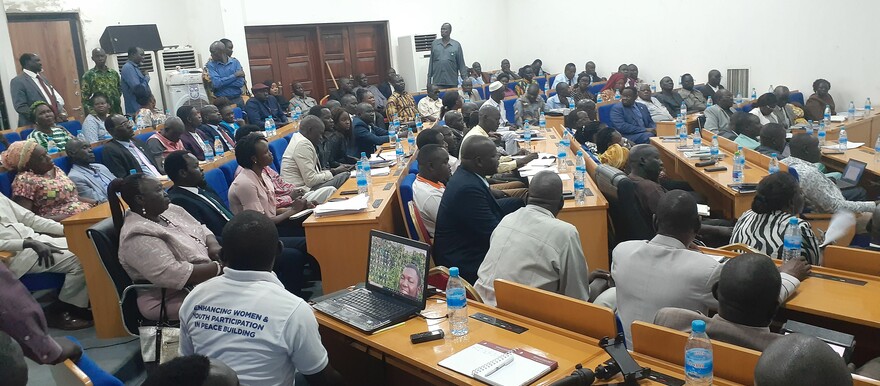The parliamentary committee on Finance and Economic Planning has concluded a public hearing as part of its inquiry into the 2023-2024 budget estimates.
During the hearing, the participants called on the parliamentarians to ensure that the increment of salaries for civil servants and the military, adjustments on the budget for health and education sectors and tax exemption on essential commodities are among the top priorities in the 2023/2024 fiscal budget.
On Monday, the parliamentary committee invited representatives of civil society organizations, doctors association, the media, women, youth, religious groups, the business community, bar association, as well as other concerned citizens to give their views on the annual budget.
Edmund Yakani, Executive Director of the Community Empowerment for Progress Organization (CEPO), said there is a need to ensure an increment in the wages and salaries of the army and civil servants.
“We would like to appeal to you as our honourable members in the parliament that wages should be a priority. As chairperson, we want to see that wages are improved. Because if you want to see that services are delivered, if want to reduce corruption, if our civil servants’ salaries remain as low as per now, corruption will not be eliminated,” Yakani warned.
According to Yakani, in order to increase the salaries and wages of civil servants, there is a need for transparency in the oil sector, especially on direct payment.
“Almost 87 per cent of payment of revenue from the oil is direct. And you know this direct payment of revenue from the oil contains hidden items, especially road construction. So, we would like to see this clearly broken down in detail because that tells us a very important thing,” Yakani stressed.
He also stressed the need to conduct the anticipated elections in 2024, as stipulated in the 2018 peace agreement, even though the preconditions of the elections are not yet fulfilled.
Anthony Garang, the Chairperson of the South Sudan Doctors’ Association, has decried low budget allocation to the health sector in the country, saying since the independence of South Sudan, the sector has remained underfunded.
He called on the parliament to increase the budget allocated to the health sector to enable the sector to purchase more medicines. “Last year, we saw 7.9% allocation. But that 7.9 allocations, if you look at it, is only allocated to institutions, not actually to the programs that are supposed to cater for the citizens of this country,” Garang said.
“The allocation is to the ministry but there is nothing like the medicines. This country does not buy any medicines, not even paracetamol. It only relies on donors and what the donors are giving is not actually enough for the people. I am calling on the national parliament and the citizens here to join us in saying that we need more money to be added to buy medicines. Medicine is what will keep the population healthy and productive, “he added.
Garang also appealed for proper investment in the health sector, saying the maternal mortality rate is high in the country because expectant women in remote areas are unable to access healthcare centres.
According to the health official, in this year’s budget, the sector is only allocated less than 3% which he said is not enough to carter for health service delivery.
Garang also wanted the South Sudan Medical Council funded in order to address malpractices in the health sector.
The same concerns were echoed by Moses Monday, the Executive Director of the Organization for Nonviolence and Development (ONAD), saying the reason why many people are diagnosed with malaria and typhoid is because the health system is very poor.
“The health Sector concerns all of us. And I would like to highlight one thing. Our system is actually very poor when it comes to public health. I want to repeat this again. The cases of malaria and typhoid we have in this country are largely attributed to our public health system,” he said.
“I am not a medical doctor, but from my basic science education, I know that public health is a problem in this country,” he added.
Ajok Ayai, a representative of Women’s Peace and Security Network, said the budget should address issues of insecurity for women, especially crimes perpetrated by criminal groups. “Most of us have talked and talked about a lot of things and we forgot the issue of insecurity for women. For us as women in South Sudan, we are facing insecurity on a daily basis. For instance, the Toronto Boys is a big challenge for us,” she said.
Responding to the views and concerns of the different groups, Changkuoth Bichiock Rieth, the chairperson of the economic and planning committee, said the committee had observed that last year the parliament did not hold public participation on the budget, stressing that citizens have the right to know how the country’s revenues are spent.
He further noted that the views raised are important before the budget is presented to parliament for deliberations, adding that they will incorporate the views expressed during the public hearing for the benefit of the citizens.




